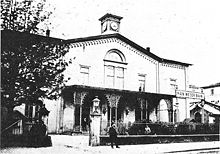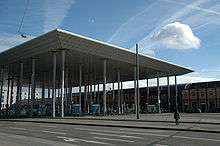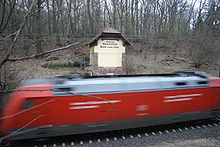- Main–Weser Railway
-
Main-Weser Railway
(Main-Weser-Bahn)Route number: 614.9 (RegioTram to Treysa)
620 (Kassel–Gießen)
630 (Gießen–Frankfurt)
645.6 (S-Bahn to Friedberg)Line number: 3900 Line length: 199.8 km (124.1 mi) Gauge: 1,435 mm (4 ft 8 1⁄2 in) Voltage: 15 kV, 16⅔ Hz AC Maximum speed: 160 km/h (99.4 mph)
Southern part onlyLegend
0.0 Kassel Hbf 


Halle-Kassel railway to Hann. Münden 





Frederick William Northern Railway to Warburg 


1.5 L 3420 



2.6 K 32 
2.7 Kassel-Wilhelmshöhe 
4.3 Hercules Railway (metre gauge) and L 3218 


Kassel-Naumburg railway 


6.3 K 2 



7.0 B 520 


Oberzwehren junction 


7.6 L 3219 


Oberzwehren crossing structure 





7.9 Kassel-Oberzwehren 


8,9 A 49 


10,0 A 44 


10.6 K 15 


10.7 Baunatal-Rengershausen 





11,4 Hannover–Würzburg HSL to Fulda 
13.5 Bauna 


Frederick William Northern Railway (to Bebra) 


13.7 Baunatal-Guntershausen 



16.3 L 3221 
16.6 Edermünde-Grifte 
17.2 Grifte–Gudensberg Light Railway 
18.2 Eder 
20.0 Felsberg-Wolfershausen 
23,2 K 151 
23.5 Felsberg-Altenbrunslar 
23.9 L 3222 
26.3 
27.3 L 3220 
27.4 Felsberg-Gensungen 
30.3 Schwalm 
33.9 Wabern) 
34.0 B 254 
Edersee Railway to Bad Wildungen 
34.4 Forststraße 
35.4 L 3148 
36.2 
36.9 
37.3 L 3148 
37.4 Abzw Uttershausen nach Wabern Kimm 
37.8 Schwalm 
38.7 
39.3 L 3149 
39.4 Singlis 
PREAG siding 
42.6 L 3384 
42.9 Borken (Hessen) 
43.4 PREAG power station and mine railway 
Hessian Brown Coal Mining Museum 
44.6 PREAG siding 
45.7 L 3149 
47.4 L 3067 
48.7 L 3067 
49.1 L 3149 
49.2 Zimmersrode 


Kellerwald Railway to Gemünden (Wohra) 


50,1 
51.5 L 3074 
54.7 Schlierbach (Schwalm-Eder-Kr) 
54.7 K 56 
56.7 L 3067 


60.7 Treysa (until 1908) 


61.1 B 454 


61.5 Schwalm 


61.9 Leinefelde–Treysa railway 
61.9 Bad Hersfeld–Treysa railway 
62.0 L 3145 
62.3 Treysa (since 1908) 
63.3 Road overpass 
67.0 B 454 
67.1 Schwalmstadt-Wiera 
67.9 K 105 
70.1 B 454 
71.0 L 3263 
71.1 Neustadt (Hessen) 
72.2 L 3071 
76.0 Wasserscheide (watershed) block post Weser and Main 


80.0 


81.4 Herrenwald-Kaserne industrial siding 


81.4 (Fritz Winter Eisengießerei industrial siding ) 


Herrenwald-Kaserne 
82.1 Stadtallendorf 
82.5 L 3290 
83.1 B 454 
86.4 K 15 
Ohm Valley Railway (from Gemünden (Felda)) 
89.1 Hindenburgstraße 
89.2 Kirchhain 
89.5 L 3073 


Wohra Valley Railway to Gemünden (Wohra) 


90.1 Wohra 


90.2 
90.8 K 11 
93.5 K 31 
94.2 Anzefahr 
95.2 
96.7 
97.3 Bürgeln 
98.0 B 3 
99.2 B 62 
99.5 Lahn 
99.8 Lahn 
Obere Lahn Valley Railway to Erndtebrück and 
Burgwald Railway to Frankenberg (Eder) 
100.3 Cölbe 
101.4 Lahn 
101.6 L 3089 
102.0 Siemensstraße 
102.1 B 3 
103.2 L 3089 
104.2 Marburg (Lahn) 
104.5 Rudolf-Bultmann-Straße 
Marburg Mitte (planned) 
105.8 L 3089 
107.1 L 3088 


107.2 Marburg SouthPassenger station until 1956 


107.4 Marburg-Süd 


107.6 Heizöllager until 1998 


107.7 Marburg District Railway 


108.5 B 255 / L 3125 


108.6 Industrial siding until 1998 


108.7 to Dreihausen 
109.1 B 3 
110.0 Lahn 
110.5 B 255 
111.9 Niederweimar 
114.5 K 60 


Aar-Salzböde Railway to Herborn (closed 2002) 


115.4 Niederwalgern (Keilbahnhof) 


116.0 K 59 



118.5 L 3048 
118.9 Fronhausen (Lahn) 
119.6 DB siding substation 
119.6 Lahn 
122.8 Friedelhausen 
122.9 K 26 
125.0 
125.3 Lumda Valley Railway from Londorf 
125.9 Lollar ) 
to Lollar–Wetzlar railway to Wetzlar 
128.7 A 480 
132.9 Gießen Oswaldsgarten 
133.0 K 28 
133.3 L 3499 
133.6 Wieseck 


Vogelsberg Railway to Fulda and… 


…Lahn-Kinzig railway to Gelnhausen 


134.0 Gießen (Keilbahnhof) 








135.5 Dill Railway to Siegen and Koblenz Hbf 


135.7 L 3475 


135.7 B 49 





Dill Railway to Siegen and Koblenz Hbf 
136.4 Straßenüberführung 
136.6 Gießen-Bergwald 
137.5 A 485 
139.7 Großen Linden 
140.0 L 3129 
141.2 A 45 
143.4 Langgöns 
143.5 L 3133 
146.1 Kirch-Göns 


151.0 Butzbach-Lich railway (connecting curve… 


151.3 …to HLB workshop and line to Münzenberg) 
151.3 B 3 
151.9 Butzbach 
152.6 L 3053 
154.6 Ostheim (Butzbach) 
156.9 A 5 
151.3 B 275 
160.6 Steinfurther Straße 
Butzbach-Lich Railway 
161.9 Bad Nauheim 
162.4 L 3143 
163.1 B 3 
163.2 Salinenstraße to Schwalheim 
164.4 B 455 


164.3 Horloff Valley Railway from Hungen/Nidda 


165.0 Rosental Viaduct 


165.1 
165.6 Road overpass 
165.7 Friedberg terminus 

Friedberg–Friedrichsdorf railway 
Friedberg–Hanau railway 
166.5 B 275 
167.3 Bridge over the Görbelheimer Hohl 
170.1 Bruchenbrücken 
172.8 Rosbach Bridge 
173.0 Wöllstadt-Nieder-Wöllstadt 
B 3 
176.2 Okarben since 1894 
178.4 Groß-Karben 
179.2 Industrial siding 
181.4 Dortelweil 
Nidder Valley Railway from Stockheim 
183.6 Bad Vilbel 
184.5 Nidda Bridge 
184.9 Bad Vilbel Süd 
B 3 
187.5 Berkersheim 
189.3 L 3003 
189.4 Frankfurter Berg (Frankfurt-Bonames until 1986) 
191.6 Eschersheim 
U-Bahn lines U1, 2, 3 
193.2 Bundesgartenschau… 
… to be re-opened as Frankfurt-Ginnheim 
U-Bahn line U1 

195.4 S-Bahn overbridge 

from Frankfurt-Rödelheim  ,
,  and
and 


right line and branch-off to: Homburg Railway 

196.4 Frankfurt West 



197.3 Frankfurt Messe 

former central goods station 

198.1 Frankfurt Galluswarte 

Main-Lahn Railway, Taunus Railway 

Main-Neckar Railway, goods track 



Hauptbahnhof approach (Main Railway etc) 

City Tunnel 

199.8 Frankfurt Hauptbahnhof 

Frankfurt Main-Weser station (to 1888) The Main-Weser Railway (German: Main-Weser-Bahn) is the railway line in central Germany that runs from Frankfurt am Main via Gießen to Kassel and named after the railway company that built the line and also operated it until 1880. It was opened between 1849 and 1852 and was one of the first railways in Germany.
Contents
Route
Based on today’s kilometre markers the line is 199.8 km (124.1 mi) long between its termini. It is double-tracked and electrified. Its maximum speed limit is 160 km/h (99.4 mph), but this is only achievable in places on the southern part of the line. The Main-Weser Railway is one of the most important conventionally-operated German railways.
History
The idea of building the Main-Weser Railway began in 1838 as a link between Kassel and the Rhine-Main area running exclusively through the territory of Hesse-Kassel (Kurhessen) and connecting the major cities of the electorate from Kassel to Hanau via Fulda. At that time it proved impracticable to build such a line (the route of the Frederick William Northern Railway and the Frankfurt–Bebra railway) because of its mountainous route, particularly at the watershed between the Fulda and Kinzig valleys at Distelrasen, where a tunnel was only completed in 1914.
So instead from 1841 negotiations commenced with some other states and was interrupted several times. On 5 April 1845, a treaty was signed between the Free City of Frankfurt, the Grand Duchy of Hesse-Darmstadt and the Electorate of Hesse-Kassel, establishing a joint state railway company, known as a condominium railway (Kondominalbahn). This established the legal basis for the line via Marburg, Gießen and Friedberg through easier terrain to the originally preferred route, but which crossed national boundaries several times. In the southern sector the route ran after its exit from the Main-Weser station in Frankfurt approximately parallel with the street of Taunusstraße (at that time, only partly built), along the current streets of Friedrich-Ebert-Anlage and Hamburger Allee to the then Kurhessen town of Bockenheim, now the site of Frankfurt (Main) West station. It then ran again through the territory of Frankfurt in Hausen, through Kurhessen in Eschersheim, and through Frankfurt territory in Bonames. The line then went through the Grand Duchy of Hesse town of Boden bis Friedberg, then a piece of Frankfurt-owned territory in Dortelweil. Bad Nauheim was a Kurhessen enclave within the Grand Duchy of Hesse exclave of Oberhessen through which the line ran to Gießen. Under the treaty, each of the participating governments were responsible for the purchase of land on their territory. Financing the construction of the line proved to be more difficult. Construction occurred during the turmoil of the revolutions of 1848 and a financial crisis in the Grand Duchy of Hesse.
Work began on 6 August 1846 in Kurhessen territory. Here the Belgian engineer Frans Splingard and his colleague Edward Hacault were in charge. In Frankfurt construction was directed by Remigius Eyssen. The building of station on almost all sections of the line in Kurhessen was directed by Julius Eugen Ruhl, the first Director General of the Kurhessen railways. The first section between Kassel and Wabern was opened on 29 December 1849. The first continuous rail service from Kassel to Frankfurt ran on 15 May 1852, after the opening of the line between Gießen and Langgöns, connecting the northern and the southern sections of the line.
The second track was added in 1865—following twelve years of negotiations. The cooperation of the participating countries had not improved despite rapidly developing rail services. The second track significantly eased the transport of Prussian troops in the War of 1866, a war which led to the annexation by Prussia of two of the states involved in Main-Weser Railway, Hesse-Kassel and the Free City of Frankfurt. Their shares were subsequently transferred to Prussia. In 1880, Prussia also acquired the Grand Duchy of Hesse’s shares in the company.
Until the completion of the Frankfurt–Bebra line in 1866, all express trains between Frankfurt and Berlin ran on the Main-Weser Railway. These trains ran on to the Frederick William Northern Railway at Guntershausen to connect with the Thuringian Railway. Express trains continued to run from Frankfurt to Berlin via Kassel until the end of World War II. In the following years of the American occupation trains also ran on this route. In 1878/79 the Treysa–Lollar section of the line was incorporated into the strategic railway known as the Kanonenbahn (English: Cannons Railway) built between Berlin and Metz.
During the 1960s, the first section of the line was electrified between Frankfurt and Giessen; electrification of the line was completed on 20 March 1967.
Operations
Two long distance routes run on the Main-Weser Railway. These are the cross-country routes of Intercity line 26 running at two-hour intervals between Karlsruhe or Constance and Stralsund or Hamburg-Altona and a pair of Euro City trains on line 62 from Siegen to Klagenfurt which run on the line between Giessen and Frankfurt, stopping at Bad Nauheim. Regional-Express train services operate between Frankfurt and Kassel and between Frankfurt and Siegen. The latter leave the line in Gießen, requiring a reversal. Regionalbahn trains operate between Marburg and Giessen and between Giessen and Friedberg. Line S6 of the Rhine-Main S-Bahn operates between Friedberg and Frankfurt South station through the City Tunnel. The section between Treysa and Kassel is operated by RegioTram Kassel Tram-trains as line RT 9. The RegioTram line commenced in May 2007 but initially only on weekends, it has since replaced the Regionalbahn trains on weekdays as well.
Many trains on the lines branching from Bad Vilbel, Friedberg, Giessen and Marburg use some of the main line. Many freight trains operate on the route including container trains and trains carrying farm equipment (such as tractors and combine harvesters) from factory. The line is also regularly used for military movements.
References
- Brake, Ludwig (2000). "Über Fulda oder über Gießen—die Entstehung der Bahnverbindungen zwischen Kassel und Frankfurt im 19. Jahrhundert (Around Fulda or Gießen—the development of the rail links between Kassel and Frankfurt in the 19th Century)" (in German). Jahrbuch für Eisenbahngeschichte (Yearbook of Railway History). 32. pp. 5–16.
- Eisenbahnatlas Deutschland (German railway atlas). Schweers + Wall. 2007. ISBN 978-3-89494-136-9.
- Krause, Günter (2000). "Die Lokomotiven der Main-Weser-Bahn (The locomotives of the Main-Weser Railway)" (in German). Jahrbuch für Eisenbahngeschichte (Yearbook of Railway History). 32. pp. 17–27.
- Landesamt für Denkmalpflege Hessen (State Conservation Hesse), ed (2005,) (in German). Eisenbahn in Hessen. Eisenbahnenbauten- und strecken 1839-1939 (Railways in Hesse. Rail construction and lines 1839-1939). 2.1,. Stuttgart: Theiss Verlag. pp. 142ff (Strecke 010). ISBN 3-8062-1917-6.
- Münzer, Lutz (2000). "Verkehr und Anlagen der nördlichen Main-Weser-Bahn (Transport and facilities of the Northern Main-Weser Railway)" (in German). Jahrbuch für Eisenbahngeschichte (Yearbook of Railway History). 32. pp. 28–60.
- Münzer, Lutz. "Vom Kondominat zur Preußischen Staatseisenbahn—aus der Geschichte der Main-Weser-Bahn zwischen (From Condominium to Prussian State Railways—from the history of the Main-Weser Railway) 1866–1880" (in German). Zeitschrift des Vereins für Hessische Geschichte 107. pp. 291–314.
- Münzer, Lutz (2004). "Von der Main-Weser-Bahn zwischen 1866 und 1880 (From the history of the Main-Weser Railway 1866 and 1880)" (in German). Jahrbuch für Eisenbahngeschichte (Yearbook of Railway History). 36. pp. 91–104.
- Sieburg, Dankwart (2000)). "Zur Entwicklung der Eisenbahnerschließung im Raum Treysa/Neustadt (On the development of railways in the Treysa/Neustadt area)" (in German). Jahrbuch für Eisenbahngeschichte (Yearbook of Railway History). 32. pp. 61–84.
- (in German) Der Viadukt. Der Rosentalviadukt in Friedberg (The viaduct. The Rosental Viaduct in Friedberg). Friedberg: Bindernagelschen Buchhandlung. 1995. ISBN 3-87076-075-3.
External links
Services Routes Frankfurt City Tunnel · Offenbach City Tunnel · Frankfurt Airport loop · South Main S-Bahn · Homburg Railway · Kronberg Railway · Limes Railway · Main Railway · Main-Lahn Railway · Main-Neckar Railway · Main-Weser Railway · Riedbahn · Rodgau Railway · Taunus RailwayCategories:- Railway lines in Hesse
- Strategic railways
- Transport in Frankfurt
- Giessen
- Marburg
- Rhine-Main S-Bahn
Wikimedia Foundation. 2010.




